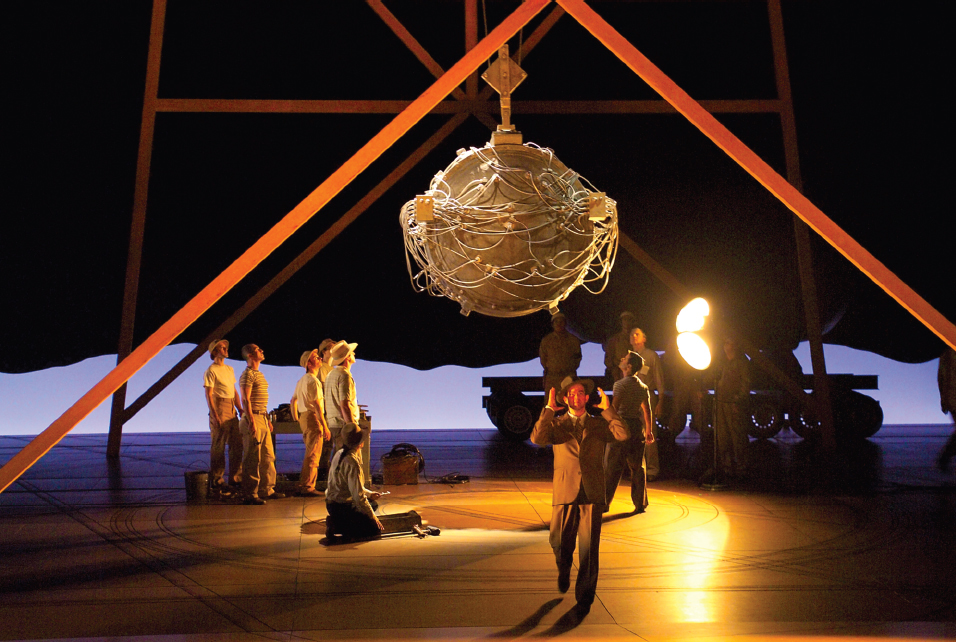John Adams, Doctor Atomic (2005)
The opera Doctor Atomic is set in the days leading up to the first explosion of an atomic bomb in the New Mexican desert in July 1945 — a month before atomic bombs were dropped on the Japanese cities of Hiroshima and Nagasaki. The opera offers, through the conventional ingredients of opera — arias, recitatives, choruses — a meditation on the ethics of unleashing such weapons in the world. The meditation comes from the viewpoints of several characters, but especially from “Doctor Atomic,” physicist J. Robert Oppenheimer, a leading figure in the top-
The end of the first act, and its moving climax, takes the form of an aria for Oppenheimer, in which he expresses all his doubts and fears about the awesome new weapon he is creating. For the words of this aria, Adams and his librettist, Peter Sellars, had the brilliant notion of using a sonnet by the early seventeenth-

Donne’s sonnet (see the Listen box) is a meditation on the difficulties the poet experienced within himself in his own Christian belief. He is “betroth’d” (promised in marriage) to an “enemy”; like citizens of a captured town, he labors in vain to admit a rescuing force — that is, God. In the opera, instead, it is the bomb itself that Oppenheimer is captured by and betrothed to, and that tears him away from all that is holy.
A sonnet is a lyric poem of fourteen lines, usually falling into two four-
Underscoring this postmodern evocation of an earlier style is the form of this aria. It opens with an orchestral ritornello (see page 116) — an almost violent passage in which brasses and timpani are prominent, reflecting Oppenheimer’s torment. After the A section, presenting the first quatrain of the poem, the ritornello reappears, and the quatrain is repeated. Only then does Adams move on to the remaining ten lines of the poem. Finally the ritornello recurs once more to end the aria, and with it Act I of Doctor Atomic. It is not an A B A form like a da capo aria, then, but an A A B form. Nevertheless, in its repeating sections clearly marked off by orchestral ritornellos it plainly evokes the earlier aria style.
In the ritornello, the repeating notes and motives for woodwinds and brass and the static, almost unchanging harmonies mark the persistence of minimalism in Adams’s style; they sound similar to certain moments in Reich’s Music for 18 Musicians. On the other hand, the frank emotionality of the melodic line for solo singer, supported by warm harmonies, carries into the twenty-
LISTEN
Adams, Doctor Atomic, Aria “Batter my heart”
| RITORNELLO |
| Batter my heart, three- |
| As yet but knock, breathe, shine, and seek to mend; |
| That I may rise and stand, o’erthrow me, and bend |
| Your force to break, blow, burn, and make me new. |
| RITORNELLO |
| Repeat music and words above, then: |
| I, like an usurp’d town to another due, |
| Labor to admit you, but oh, to no end; |
| Reason, your viceroy in me, me should defend, |
| But is captiv’d, and proves weak or untrue. |
| Yet dearly I love you, and would be lov’d fain, |
| But am betroth’d unto your enemy; |
| Divorce me, untie or break that knot again, |
| Take me to you, imprison me, for I, |
| Except you enthrall me, never shall be free, |
| Nor ever chaste, except you ravish me. |
| RITORNELLO (end of Act I) |